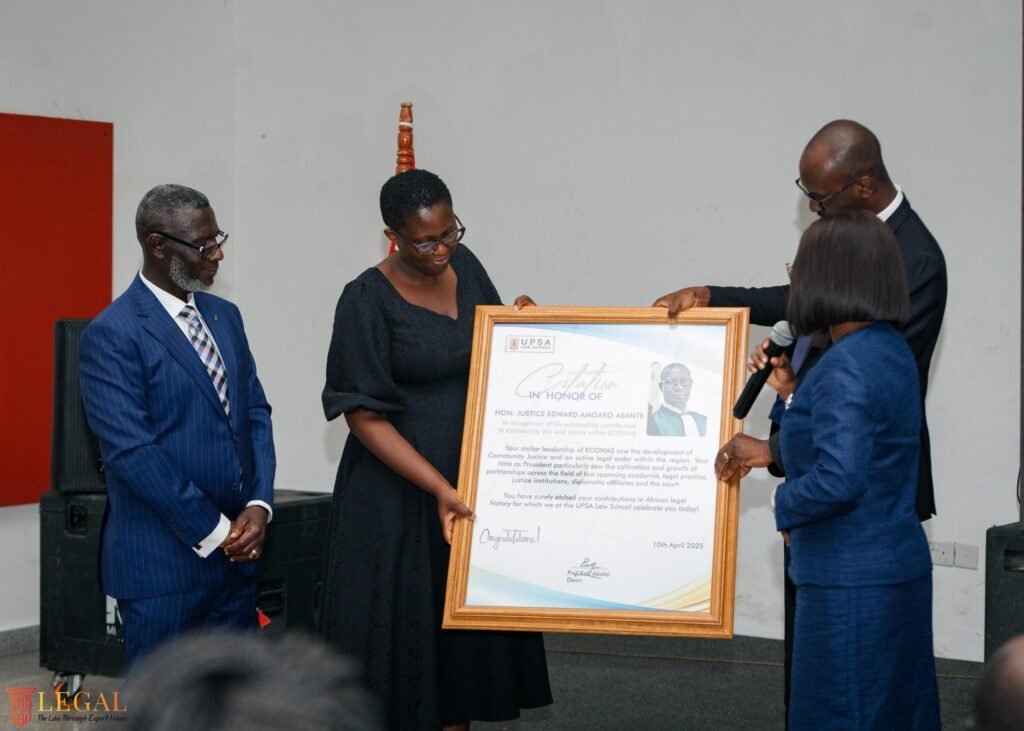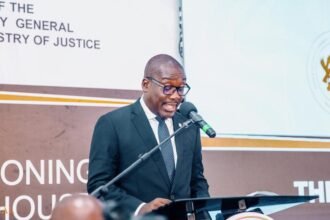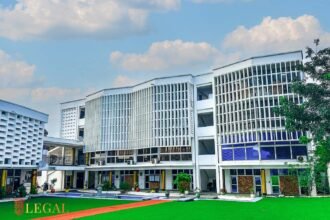
April 21, 2025
The Faculty of Law at the University of Professional Studies, Accra (UPSA) hosted a compelling public lecture on Thursday, April 10, 2025, featuring Hon. Justice Edward Amoako Asante, Immediate Past President and serving Judge of the ECOWAS Court of Justice. The lecture, titled “Building a Community Court of Justice That Works for the Citizen of ECOWAS: Some Reflections,” offered deep insights into the evolution, jurisdiction, and future prospects of the regional court.
The event was graced by Her Ladyship Justice Gertrude Sackey Torkornoo, Chief Justice of the Republic of Ghana, who served as Guest of Honour. Hon. Samuel Okudzeto Ablakwa, Minister of Foreign Affairs, chaired the occasion, adding a high-level diplomatic touch to the intellectual discourse.
In his address, Justice Asante expressed appreciation to the Dean of UPSA Law School, Prof. Kofi Abotsi, for the warm invitation and meticulous organization of the event. He briefly reflected on his judicial journey, from his early days as a Circuit Court Judge in Obuasi in 2002 to his appointment as President of the ECOWAS Court of Justice in August 2018 – a role he held until October 2024. While his tenure as President concluded, he continues to serve as a Judge until August 2026.
Justice Asante structured his reflections around five key themes:
- The origins and operationalization of the Court
- Its mandates and jurisdiction
- Accessibility for ECOWAS citizens
- Contributions to human rights, democracy, and the rule of law
- Challenges and the path forward
He traced the Court’s conceptual roots to the 1975 ECOWAS Treaty, with its formal establishment in 1991 and operationalization in January 2001. A significant turning point was the 2005 Supplementary Protocol, which broadened the Court’s jurisdiction to include human rights matters and allowed individuals direct access to the Court.
Justice Asante outlined the Court’s multifaceted jurisdiction, which includes:
- Interpretation and application of ECOWAS legal instruments
- Advisory opinions
- Public service disputes within ECOWAS
- Arbitration
- Human rights adjudication
The venerable Jurist highlighted that the human rights mandate has effectively transformed the Court into a citizen-focused institution. Importantly, individuals do not need to exhaust local remedies before approaching the Court, a unique provision among international tribunals. The doctrine of actio popularis has further empowered NGOs and public-spirited individuals to bring forward public interest cases.
Efforts to improve access were detailed, including public sensitization campaigns, external court sessions (such as the one held in Accra in March 2022), and digitalization of processes. The upcoming launch of the Electronic Case Management System (ECMS), expected before the end of April 2025, is set to enhance accessibility, transparency, and efficiency.
Justice Asante proudly reported that, as of February 28, 2025, the Court had received 727 filings and delivered 649 decisions—cementing its status as arguably the most active international court in Africa. He referenced several landmark human rights cases, including:
- Hadijatou Mani Koraou v. Niger
- WAVES v. Sierra Leone
- Dorothy Chioma Njemanze v. Nigeria
- Barry Abdoulaye Sadio & 3 Others v. Guinea
- Amnesty International & Others v. Togo
- SERAP & Others v. Nigeria
These decisions underscore the Court’s role in safeguarding civil liberties, political participation, gender rights, and digital freedoms.
Turning to challenges, Justice Asante identified enforcement of judgments as the Court’s most pressing concern. Under Article 24 of the Court’s Protocol, enforcement relies on self-compliance and the cooperation of national authorities- a mechanism that has proven inadequate. He cited Chude Mba v. Ghana as a case emblematic of enforcement difficulties. To address this, the Court has initiated amendments to Article 24, seeking to empower individuals to enforce decisions and request sanctions where necessary.
Justice Asante also called for deeper engagement with stakeholders beyond national capitals and lauded Ghanaian law schools for incorporating ECOWAS law into their curricula. He announced the forthcoming maiden ECOWAS Community Law Moot Court, which aims to nurture the next generation of regional legal advocates.
In his closing remarks, Justice Asante reflected on his tenure, noting milestones such as the Court’s relocation to a larger office, increased output of judgments, and its growing reputation as Africa’s most efficient sub-regional court. He concluded with a strong call for continued collaboration among all stakeholders to build a more effective, accessible, and impartial ECOWAS Community Court of Justice.











